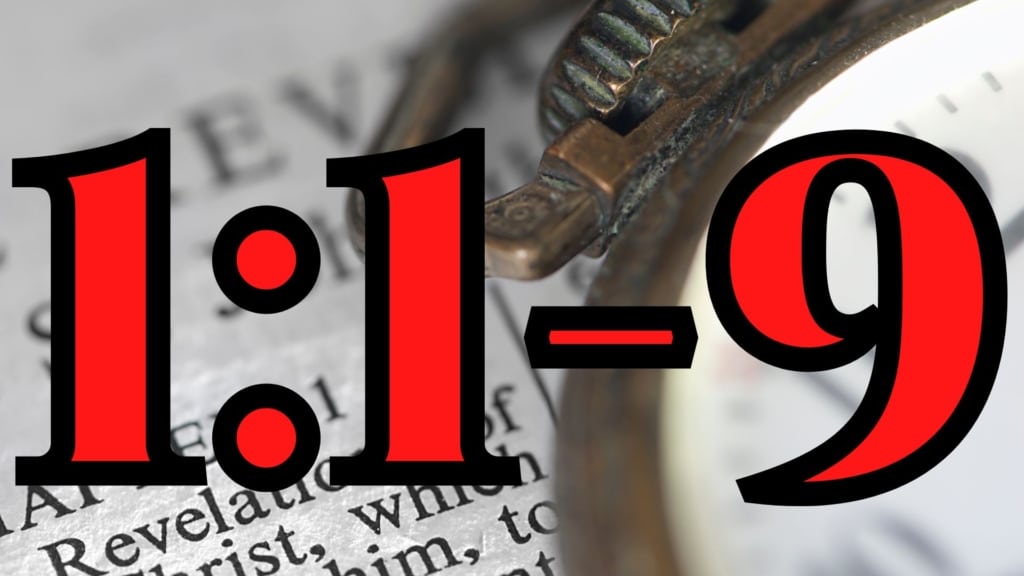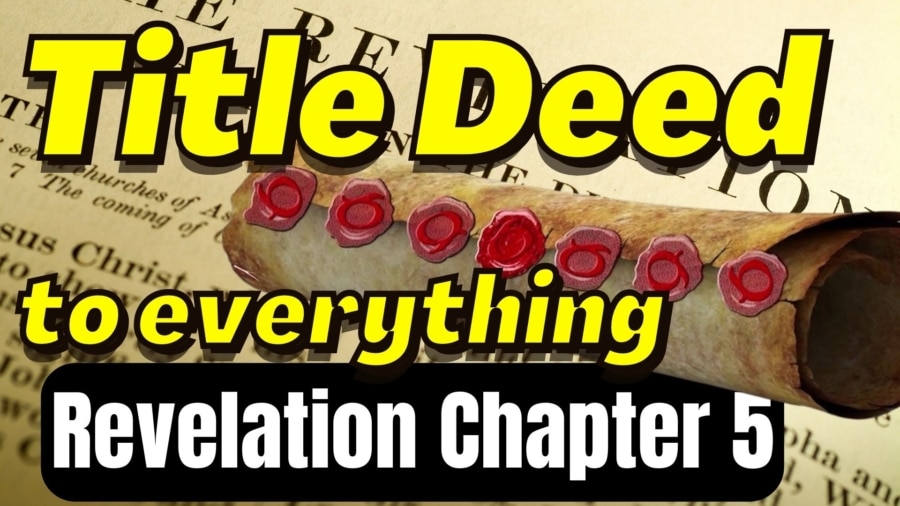>>>Notes for Revelation can be found HERE <<<
The three-fold outline of the book Revelation one is found in verse 1:19. Notice that Jesus says, talking to John, “Write the things that you have seen, the things which are, and the things that shall take place after these things.” If you look through the Book of Revelation, you’ll find that the phrase “after these things” is repeated over and over. And why is that? I think John is emphasizing to us that there is an orderly development of how things are going to happen. Some of it’s difficult to understand. Some of it we probably can’t fully grasp. But John wants us to understand that what is coming during the seven years of tribulation is going to be a very orderly, systematic judgment of God on the Earth. So he says, “Write the things that you have seen,” in the past tense. Right? So, what has John seen in the past in Revelation chapter one? The vision of Christ. He’s recorded that for us. “And the things which are” represent chapters two and three which deals with the seven churches of Asia. “The things that will take place after this,” represent Chapters four through 22. So, John really gives us his own outline. And if we just follow that outline, it’ll save us from a lot of confusion.
In the first few chapters, we have the seven churches as John ministered to them. In Chapters four and five, we see the church in heaven. There are certain things that are said that tell us that that can only be the church in heaven, which fits with our understanding of the rapture of the church. What do we read in Revelation 4:1? “I heard a voice saying, ‘Come up here.’”. Then in Chapters six through 19, we have the tribulation period itself. It’s very interesting to notice, the word church occurs 19 times in the first three chapters. It does not occur from Chapters six to 19 — the section that deals with the tribulation period. Instead, who do we read about? The nation of Israel. Remember that Paul tells us in Romans 11:25. “Blindness, in part, has happened to Israel.” God is faithful to His promises; what about the nation of Israel? Is God finished with the nation of Israel? Their time is yet coming, and that’s going to be the tribulation period. So, in chapter six through 19, we read about Israel. We read about the tribes. We read about Jerusalem. The whole focus goes back to the promised land.
So let’s go back to Revelation 1:1. “The revelation of Jesus Christ, which God gave to Him to show His servants things that must shortly take place and He Jesus sent and signify it by His Angel to his servant, John.” So, this book has been passed down from the Father to the Son to an angel to John. “Who bore witness of the Word of God in the testimony of Jesus Christ to all things that He saw. Blessed are those that read and hear the words of this prophecy and keep the things that are written in it for the time is near.” Because the Book of Revelation deals with everything from the time of John till the end of the Kingdom. No matter where you live in that time, the time is near because whatever is next to come is going to come and it’s going to come quickly. We notice several purposes behind the book: 1) to reveal Jesus Christ, 2) to reveal the course history, 3) to finish John’s testimony, and 4) to bless those who study the book and not only study but obey the book.
John identifies himself now in Revelation 1:4, “John to the seven churches which are in Asia.” This a typical opening of a letter in the ancient world; you identified yourself first and then identified who you’re writing to. “Grace to you and peace from Him, who is and who was and who is to come. And from the seven spirits who are before the throne.” So, what is “who is and who was and who is to come?” They mean that He’s infinite, and eternal. “The seven spirits before his throne” harkens to Isaiah 11:2, which lists the spirits of God having seven characteristics. So essentially, he’s talking about the Holy Spirit. The interesting thing to me at this point, in the first four versus we have the Father, we have the Son, we have the Holy Spirit, and they’re all sending greetings to us. They’re all working for our spiritual well-being.
Revelation 1:5 says, “From Jesus Christ, the faithful witness, the first born from the day of the ruler over the kings of the earth. To him who loved us and washed us from our sins in his own blood.” This is talking about the finished work of Christ on the cross, the one who provided for us our so great salvation. Revelation 1:6 should really excite us, “and has made us kings and priests.” In all the Old Testament, you never read of a prophet, priest, and king together. Jesus is prophet, priest, and king. Here, we’re told, “He has made us kings and priest.” You can go to 1st Peter 2:9, where Peter reminds us that we are a royal priesthood. There was no royal priesthood in the Old Testament, with one exception: Melchizedek the King priest.
Revelation 1:7 says, “Behold, He is coming with clouds.” I don’t know about you, but I long for it more and pray for it more every day. “He is coming with clouds and every I will see him. Even they who pierced him, and all the tribes of the earth will mourn because of him.” Which coming is John talking about — the Rapture or Jesus’ second coming? Ask yourself the question, at the rapture will every eye see Him? No, not unbelievers. It’s going to be a secret departure. They will not see him. We will simply be gone. So, we know we’re talking here about the second coming. “All the tribes in the earth will mourn because of him.” Revelation 1:8 says, “I am the alpha and the omega, the beginning and the end says Lord.” Which “beginning” is this? Go back as far as you want. “In the beginning, God created the heavens and the earth.” That’s the beginning of creation. And then we have in John 1:1, “ In the beginning was the word.” What beginning is he talking about? As far back as you want to go into eternity past, and whatever beginning you can imagine and He was there. That’s the one “who was.” In first John 1:1 says, “That which you heard from the beginning.” You might remember too in Mark 1:1, “The beginning of the gospel of Jesus Christ,” a different beginning. Here in Revelation 1:8, the Lord says, “I am the beginning, and the end says the Lord, who is and who was and who is to come. The Almighty.” What amazing statement of His dignity and glory and majesty.
In Revelation 1:9, John begins to describe for his congregations the conditions of his vision. “I, John, your brother and companion in the tribulation and kingdom and patience of Jesus Christ.” We’re all in this together as children of God. He continues, “I was on the island that is called Patmos” off the coast of Turkey, “for the word of God and for the testimony of Jesus Christ.” In other words, under persecution under Emperor Domitian, John was having too much effect, just like Paul was earlier. But unlike Paul, who was executed for his testimony, Domitian just shut him away on the Isle of Pattern of Patmos so John could write Revelation.
Gene Cunningham - May 23, 2000
Living Sacrifice 32
Scripture References: John 2:15, Revelation 1:20, Revelation 22:12, Hebrews 12:1-2, John 3:1-3, Revelation 2:1-5, Proverbs 3:12, Psalms 103:5, Luke 2:25, Psalms 103:2, Revelation 2:5, Titus 2:10-13, Matthew 5:3-12, Revelation 2:4, Psalms 37:4, Revelation 2:10, Colossians 3:1-3, Revelation 2:3, Hebrews 12:1-29, James 1:12, Philippians 3:20, Revelation 2:2, Romans 8:1-39, Philippians 4:1
From Series: "Living Sacrifice (1995)"
Romans 12 and specifically Rom 12:1-2 is a pivot point between the doctrinal section and application of the book. This series methodically uses this passage to outline aspects or doctrines of the christian life -- God's provision and our prospect. Our lives can be acceptable to God if we progress on the path He intends. Living Sacrifice presents 12 doctrines: (1) redeeming time; (2) standing (positional truth); (3) self-presentation - availability; (4) approval; (5) service; (6) provision; (7) spiritual warfare; (8) conformity; (9) spiritual advance; (10) renewal; (11) divine guidance; (12) abundant life.






























